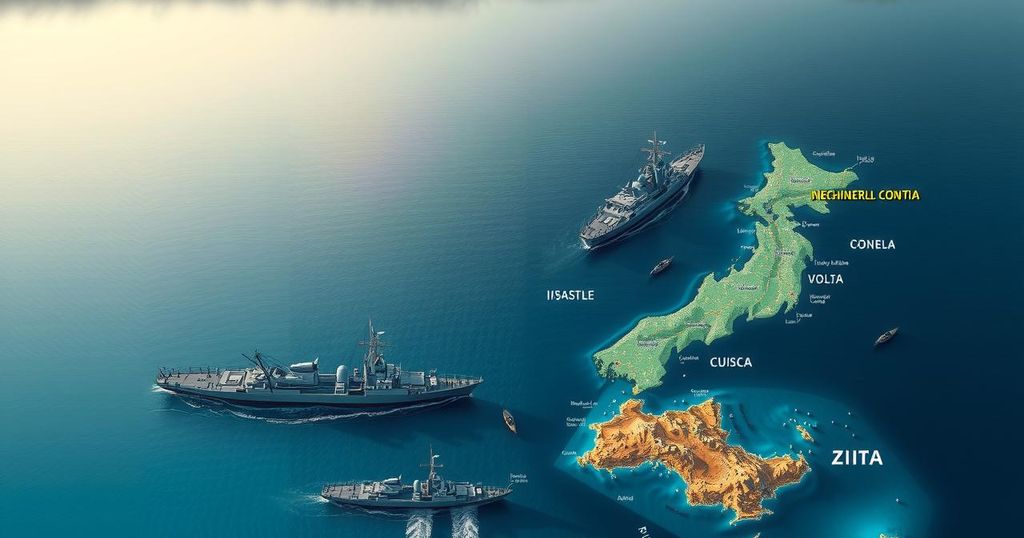On March 1, 2025, a Venezuelan warship entered Guyana’s EEZ, escalating tensions in a long-standing territorial dispute over the Essequibo region. Despite international support for Guyana’s response against this incursion, Venezuela continues to assert claims to the contested waters. The ongoing conflict reflects complex political maneuvers by Venezuela’s Maduro regime amid international geopolitical shifts, highlighting the urgent need for a coordinated global response to prevent further escalation.
On March 1, a Venezuelan naval vessel entered Guyana’s exclusive economic zone (EEZ) and demanded information from the crew of the Liza Destiny, an oil facility operated by ExxonMobil. This incident marked a significant escalation in the enduring territorial conflict between Guyana and Venezuela. Although Guyana condemned the incursion and focused on seeking a peaceful resolution, it emphasized its commitment to safeguarding national sovereignty, a claim contested by Venezuela, which insists that the waters are part of a disputed maritime zone.
Over the past year and a half, tensions surrounding the Essequibo territory have fluctuated, leading to increasing friction. In September 2023, the Venezuelan National Assembly commenced a referendum process aimed at establishing the state of ‘Guayana Esequiba,’ contravening an International Court of Justice (ICJ) directive for Venezuela to refrain from unilateral action until a ruling is made. The referendum, held on December 3, 2023, was swiftly challenged by Guyana. Concurrently, military infrastructure improvements were underway in the Essequibo territory, culminating in a meeting between leaders of both nations in February that resulted in the Argyle Accords, an agreement aimed at deescalating tensions through peaceful dialogue.
Despite the Argyle Accords, tensions continued, particularly following the deployment of a British warship to Guyanese waters in late December 2023, which provoked a military response from Venezuela. In April 2024, President Maduro signed a law to formally assert control over ‘Guayana Esequiba,’ igniting fresh backlash from Guyana. The context grew more complex as Guyana sought ICJ assistance in early 2025 against Venezuela’s plans for electoral governance in the disputed area, while also coping with armed confrontations along the border.
The Maduro regime’s renewed focus on the Essequibo dispute appears to serve dual purposes: rallying domestic support ahead of elections, and signaling a willingness to test U.S. geopolitical interests in the region. Observations of military build-up in the Essequibo territory indicated an effort to galvanize political loyalty amongst the armed forces and an intention to strong-arm negotiations with Guyana. Additionally, current U.S. policies and events such as the exchange between Presidents Trump and Zelensky have created an environment whereby Maduro seems emboldened to navigate this complex geopolitical landscape to Venezuela’s advantage.
The recent naval incident differs from previous maritime confrontations as it signifies Venezuela’s overt display of military power near Guyana’s established oil exploration zones. The warship’s actions were a direct challenge to Guyana’s operations, especially significant given ExxonMobil’s planned increases in oil production, expected to surpass Venezuelan output. This escalation indicates Venezuela’s intent to assert dominance over Guyana’s economic activities and infuse uncertainty in the region’s energy sector.
Resolving this crisis necessitates robust international engagement, as Venezuela lacks incentives to de-escalate without external pressure. Maduro’s efforts to position himself within the current U.S. administration’s geopolitical calculations suggest a deliberate strategy to provoke instability. Countries including Brazil, China, and European nations have stakes in the outcome, particularly in maintaining regional stability and energy supply. Coordinated efforts to deter Venezuelan aggression and promote dialogue are essential to avoid further escalation and safeguard the interests of neighboring countries.
The naval incursion by Venezuela into Guyana’s exclusive economic zone on March 1, 2025, represents a significant escalation in the long-standing maritime boundary dispute. The recent military activities reflect both Venezuela’s attempts to consolidate domestic support and assert regional influence, especially in the context of heightened geopolitical tensions. The necessity for international engagement and a coordinated response is paramount to prevent further provocations and ensure stability in the region. The incident underscores the fragility of relations between Venezuela and Guyana, calling into question the effectiveness of established treaties and international rulings in maintaining peace.
Original Source: www.csis.org






